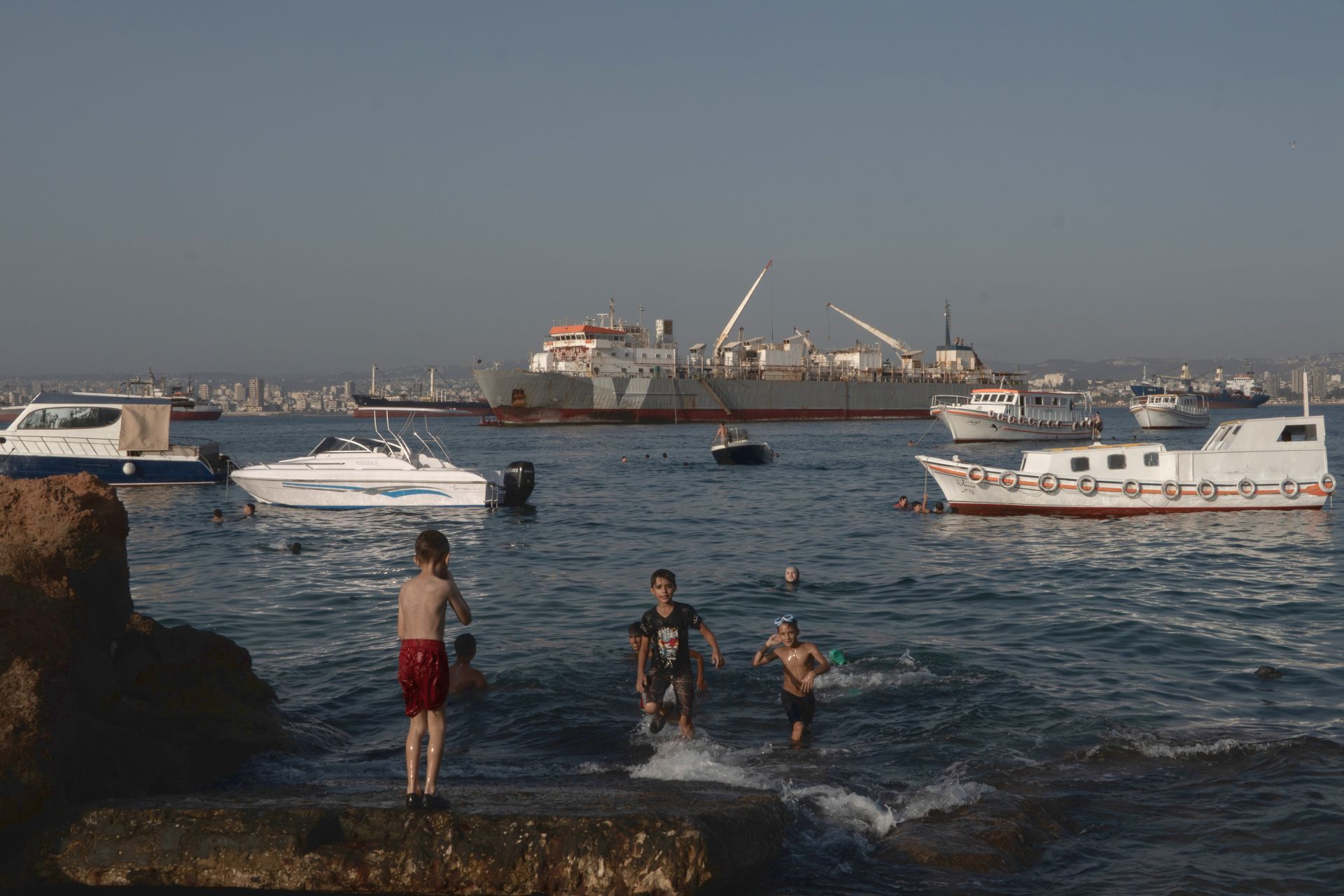In the searing sun, against a backdrop of blue Mediterranean waters, men hammer nails into the stern of a wooden boat. Over thousands of years, many hands have worked away at breathing life into these vessels. The half-built skeletons dot the sand as their completed counterparts, painted in white, blue and red, line the horizon behind them.
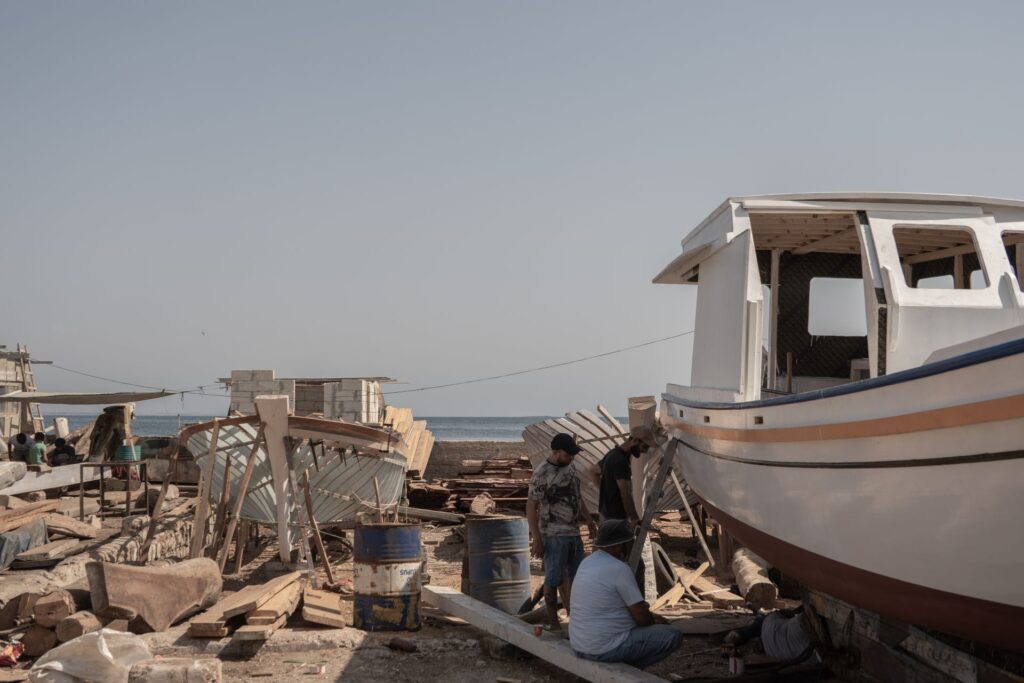
A few feet away, Mohamed Bahlawan watches. His wrinkled hands clutch a walking stick, and his eyes are cloudy with age. He squints as he speaks, his words slow but clear. “What we do here, it’s rare even globally,” he says, a glimmer of pride in his voice. “Our work is unique in the whole world.”
Bahlawan is a native of Arwad, an island 2.5 miles from Syria’s coastal city of Tartus. Arwad is the only one of Syria’s handful of islands that is inhabited, and it is famed in part for its Phoenician boatbuilding tradition, which dates back over 2,500 years.
Almost all the inhabitants of the idyllic beach town are Sunni. During the civil war that battered most of the country, Arwad escaped physically unscathed, but many fled by sea to escape the regime of Bashar al-Assad or the mandatory military service for young men. Many others moved to the mainland in search of work.
The islanders’ livelihoods are closely intertwined with the sea that surrounds them; most people are either sailors or fishers, with a small portion of them embracing the boatbuilding tradition. Bahlawan inherited his profession from his father, who learned it from his own father. He reminisces about how the craft has changed over the years.
“In the beginning, our work was done by hand. … We didn’t have electric equipment, we had the saw, the adze, the drill. Later, we developed: We got a sawmill, started working with electricity,” he explains, his voice drowned out by the sound of a drill.
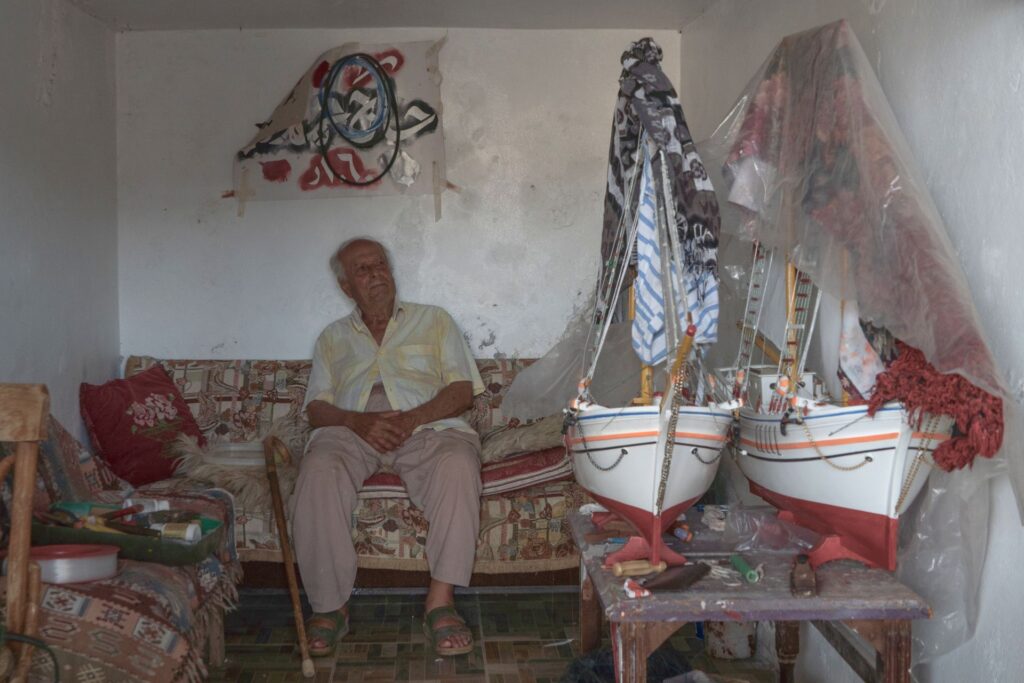
Not far from him, his son, Farouk Mohamed Bahlawan, handles the production of a boat near his workshop by the sea. Farouk, who is 55, has been working in the field for 45 years. During the civil war, he struggled with the high prices of raw materials, which in turn affected his exports. This was compounded by the nightmarish bureaucratic procedures of Syria’s General Authority for Land and Seaports. “There was a time when getting a [boat] construction permit meant having to pay a bribe,” he explains. “It’s now peaceful and things are facilitated, and we’re encouraged to stay in this profession.”
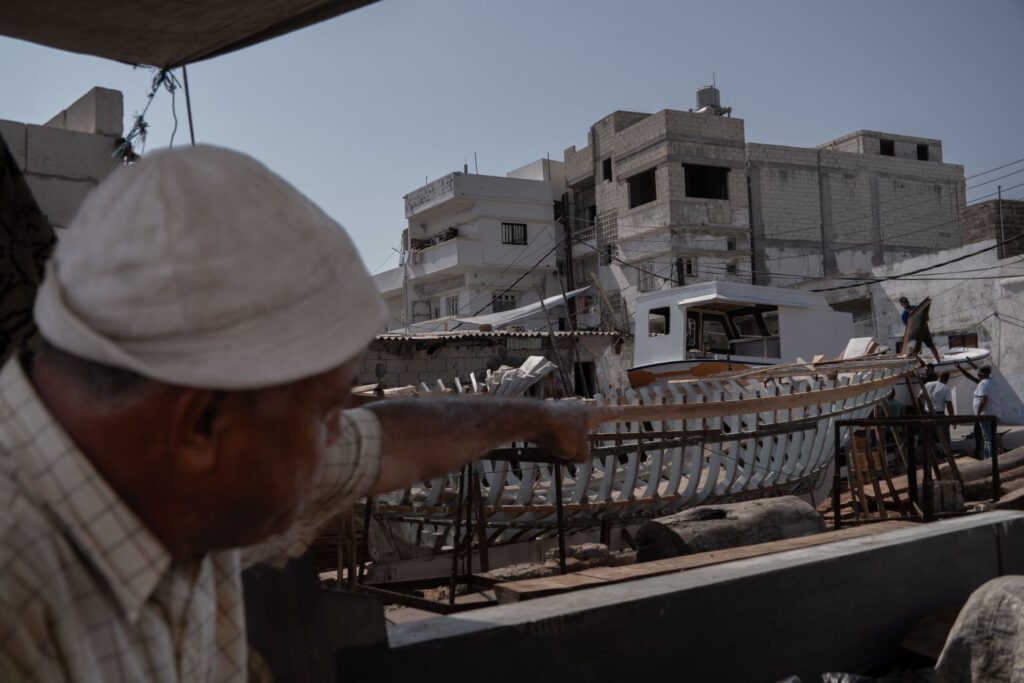
Farouk’s boatbuilding — an innocent endeavor — got him in trouble with the Assad regime in 2015. He was detained for nine days at a security branch in the Kafr Sousa district of Damascus, after it was discovered that he had produced a boat used by some people fleeing Lebanon. “I didn’t do anything except produce and export the boat,” he explains, laughing in bemusement.
Nazem Taleb, current head of Arwad port, listens as Farouk speaks. Taleb’s office is on the first floor of a building that looks out on where the ferries arriving from the mainland dock. Opposite his desk is a bedroom, which is where he spends his nights.
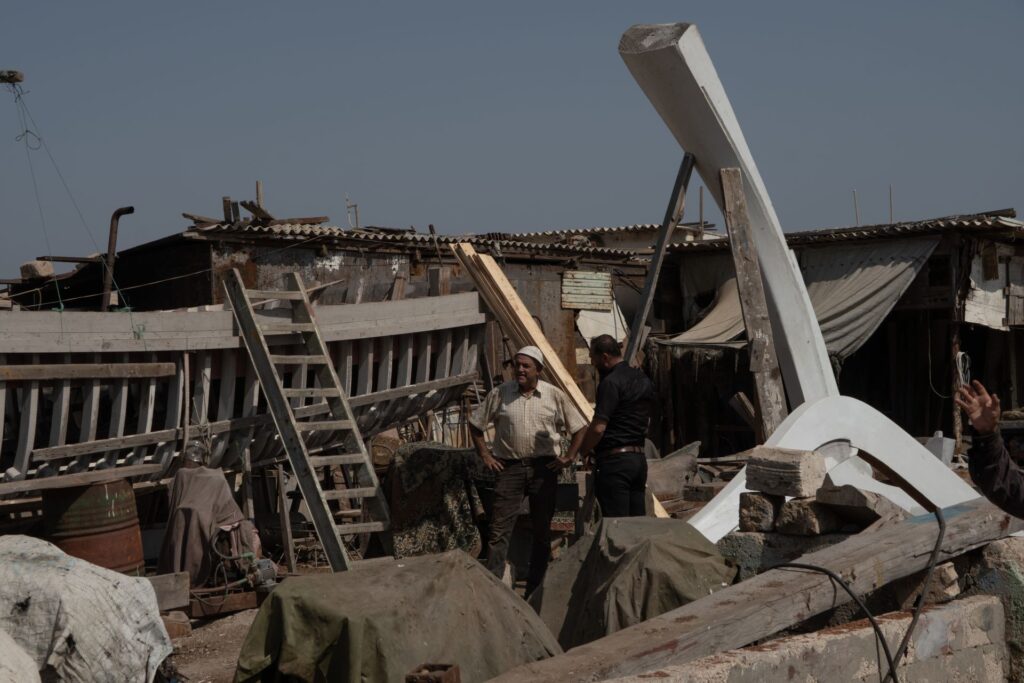
Taleb explains how the war and the presence of checkpoints — often a site of arrests as people traveled between governorates — dissuaded people from visiting Arwad. “It’s not just that the [number of tourists] fell; you can say there were none,” he explains, adding that now the island often sees visitors from different parts of Syria as well as other countries like Lebanon and Turkey.
Hiba Qanatre, 40, is one of these visitors from Idlib. Ahead of the fall of the regime, visiting the island was nearly impossible due to the ongoing civil war. Idlib was governed by the rebel group Hayat Tahrir al-Sham, unlike other parts of the country that remained under Assad’s rule.
“Before the revolution, I used to visit Arwad a lot — after the fall of the regime, it’s my first time,” she explains, seated on one of the ferries that move between Tartus and the island. Taleb says there are about 30 to 40 boats that come to the island per day, each carrying about 40 individuals. “As a first step, the number of visitors is good,” he says.
Qanatre’s 9-year-old niece, Sara, looks on as her aunt talks about their visit. She’s accompanied by her own mother and by her cousin, Naya. As the boat approaches Arwad, the girls flash toothy grins, forming hearts with their fingers as they pose with the island to their backs. Their mothers smile, holding up a phone to photograph them.
“It’s my first time coming to this island, it’s so different [from Idlib],” she says, brushing away strands of hair that the strong wind blew into her face. “There’s a sea here, and we don’t have the sea — the weather is nicer, too.”
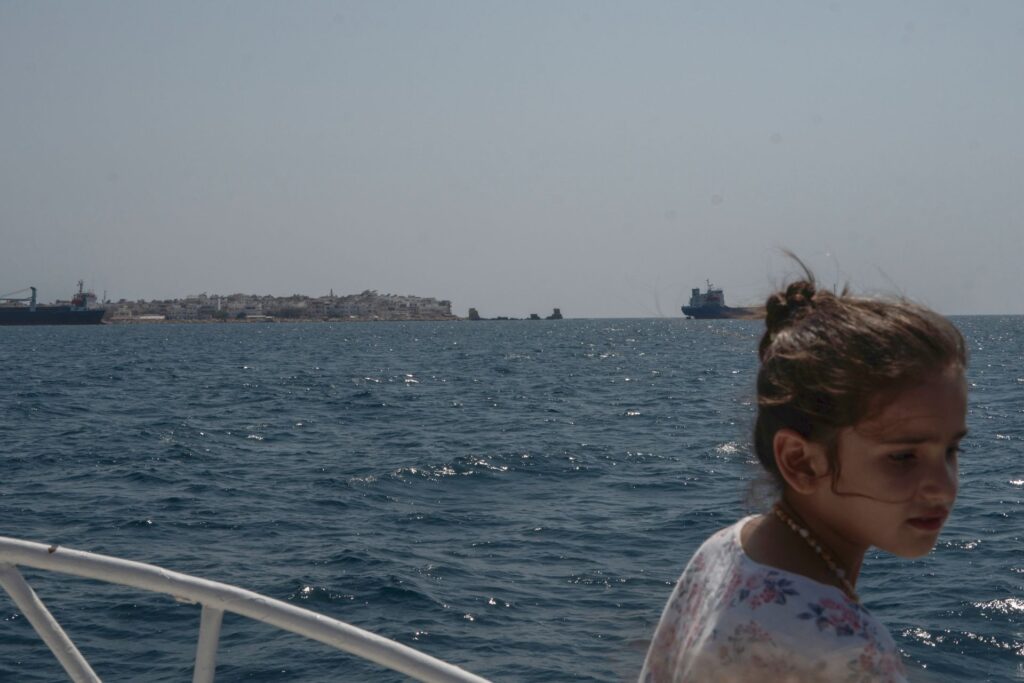
During Assad’s rule, the air was always dominated by the permeating scent of distrust and the much-feared state intelligence services. As with most other parts of the country, Arwad’s residents felt the regime’s chokehold, too. Now, people amble about in the heat, their hands sticky with melted ice cream eaten by the seaside. There are no blaring honks of cars or smoke from traffic. There’s a sense of familiarity between residents who pass each other.
Further inland, Mustafa Ali Bahar, a resident of Arwad island, looks on proudly at a placard he’s placed in front of his son’s sweets and refreshment shop, where he was helping out.
Next to a caricature of the toppled President Assad are the words “Why should we meet? To have drinks, for example, haha.” The line is a reference to Assad’s reply to a reporter when asked, in an August 2023 interview, why he refused to engage in talks with Turkish President Recep Tayyip Erdoğan. “Before, this would take me to Sednaya,” he says, pointing at the placard, referring to the infamous prison in which regime opponents and ordinary Syrians were tortured.
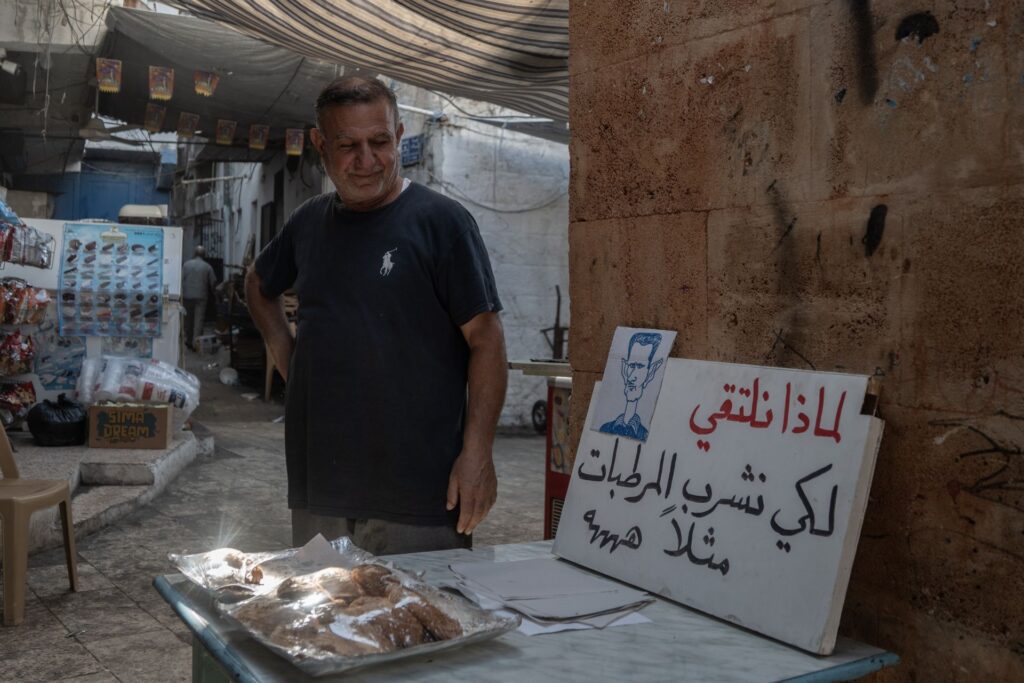
He admits, however, that not all scars have healed. He says men often fled to sea to escape mandatory military service, but that some of those detained by the government are yet to return. Their fate remains unknown.
“In Arwad, we’re all like a family — some of my neighbors were wanted, some of my relatives were,” he says, adding that the island was heavily infiltrated by different bodies of the state’s intelligence and administrative branches. “After the liberation, many of [those who fled] returned.”
Farouk Bahlawan says that Arwad’s situation has undergone a “180-degree turn” since the regime fell, but that he’s hoping for facilities to improve further. “The difficulties we have today are with [the lack of] electricity, and we need taxes from the municipality or interior ministry to be reduced so we can continue working in this field,” he says.
Born into a family steeped in the knowledge of the boatbuilding tradition, Farouk’s sons were keen to follow in his footsteps, but Farouk felt differently. His sons are now trained in mechanical engineering. “They wanted to learn the craft, but I didn’t let them,” he says, his voice rising a little defensively. “In the early 2000s, we were oppressed and controlled a lot by the ports directorate, and because of this, I didn’t teach them.”
Most islanders struggled in those times to practice their trade, which helped to dissuade them from passing it on to their children. Mustafa Alaa Othman, a fisher on the island, says that, although his children haven’t opted to take up his line of work, one of them decided to pursue maritime studies — a pathway to becoming a maritime officer.
Othman explains that prices were sky high and that the regime widely conducted blast fishing, a toxic practice that kills fish in the water, in order to monopolize the trade. “Eventually, this practice affected us, and we couldn’t say anything,” he says, adding that he now hopes for the golden days, when the seas were teeming with fish, to return.
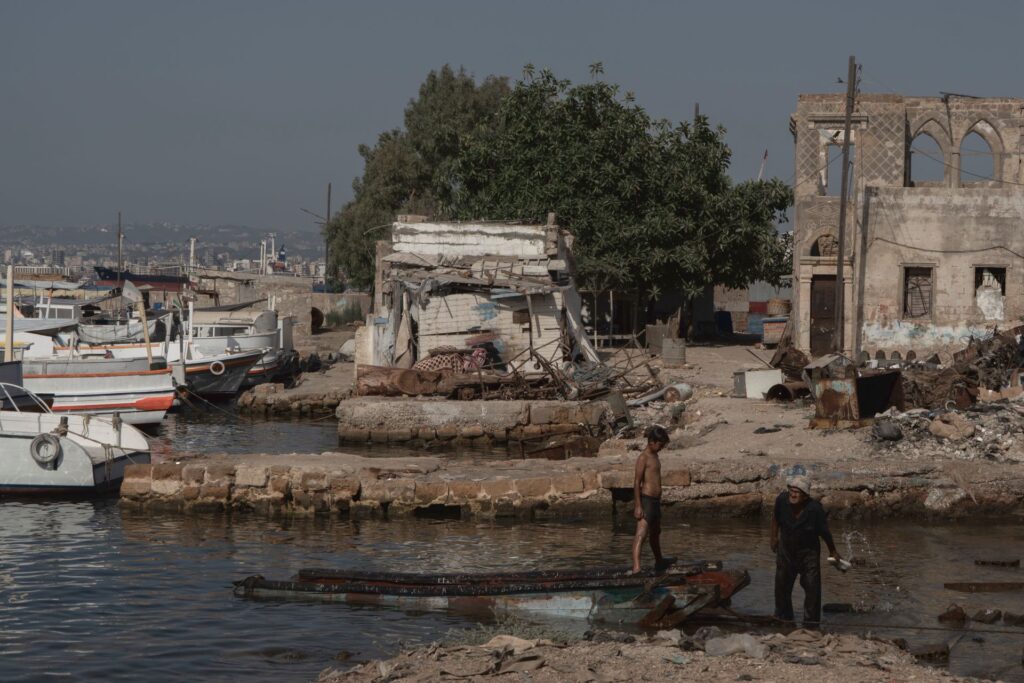
Farouk, too, is optimistic about the future of his work on the island. He says he’s pushing for the state to set up an institute where individuals are trained in boatbuilding, so that more young people can specialize in the trade.“I would take up the role of a teacher in such a school, so that this profession can continue to exist,” he says.
For him, boatbuilding is a way of life rather than just a source of income. He says he remembers every single boat he has built in the past 30 years. “When I see one of my boats neglected or in need of repair, it hurts me deeply,” he explains. “I deal with the boats like they’re human.”
Othman echoes the sentiment; he believes Arwad Island must be treasured and supported financially. A man of the sea, his relationship with the stormy waves and his love for his lifestyle have only strengthened over the years. “People whose hobbies are related to the sea; they’ve got nothing but the sea,” he says. “The sea is like a king, with a personality of his own.”
He has a sister who lives in Baniyas, a coastal town on the Syrian mainland, but the lifestyle doesn’t appeal to him. “In 20 years, I’ve only slept at her place once while visiting,” he says, laughing.
“Spotlight” is a newsletter about underreported cultural trends and news from around the world, emailed to subscribers twice a week. Sign up here.



